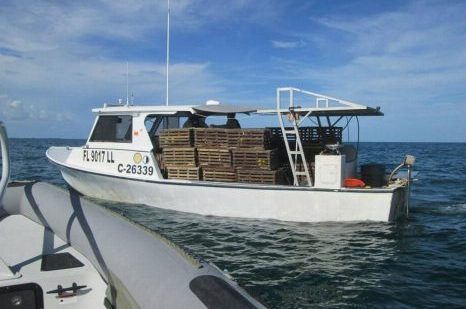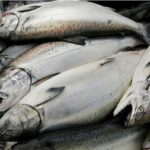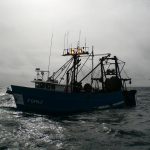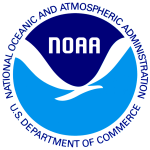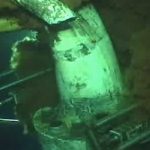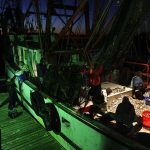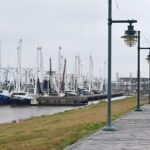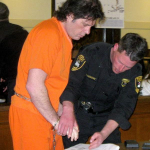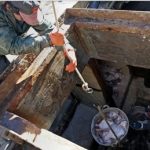Monthly Archives: August 2017
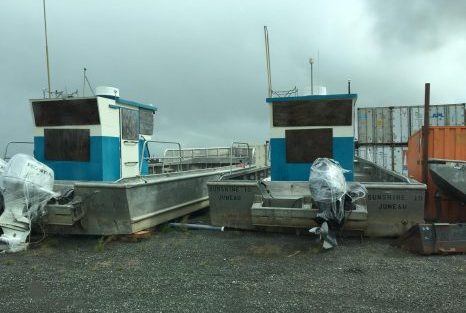
Quinhagak commercial fishermen struggle after two years without a buyer
Several weeks ago, the financing fell through on a plan to bring the “Akutan,” a floating fish processing vessel, to Kuskokwim Bay. For the second summer in a row, fishermen in the coastal community of Quinhagak have nowhere to sell their catch; many in the village are now struggling to make ends meet. Timothy “Johnny Boy” Matthews doesn’t remember when he started fishing commercially.,, Matthews has a family of his own now. He bought his own limited entry permit a decade ago and spent his summers selling silvers to a newly opened processing plant in Platinum. It’s owned by Coastal Villages Region Fund (CVRF), a corporation that is supposed to use its Bering Sea fishing quota to support economic development in the area. But CVRF decided not to re-open its plant last year,,, Audio, read the story here 12:17
FISH-NL urges provincial government to establish Fishery Stress Line similar to one for western farmers
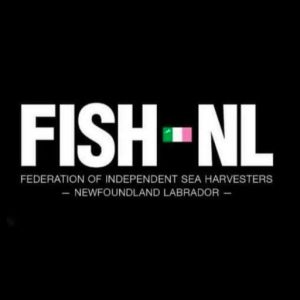 The Federation of Independent Sea Harvesters of Newfoundland and Labrador (FISH-NL) is calling on the provincial government to establish a Fishery Stress Line to help inshore harvesters access help for mental health. “The fishery is in worse shape today than the cod moratorium days of the early 1990s because harvesters have bigger loans, and there are no other species to move onto,” said Ryan Cleary, President of FISH-NL. “More and more harvesters are having a hard go of it because of quota cuts that make it difficult for them and their families to keep going financially, and they see the future as bleak.” Saskatchewan has had a Farm Stress Line since 1989, offering mental health services to thousands of rural farmers. click here to read the press release 10:49
The Federation of Independent Sea Harvesters of Newfoundland and Labrador (FISH-NL) is calling on the provincial government to establish a Fishery Stress Line to help inshore harvesters access help for mental health. “The fishery is in worse shape today than the cod moratorium days of the early 1990s because harvesters have bigger loans, and there are no other species to move onto,” said Ryan Cleary, President of FISH-NL. “More and more harvesters are having a hard go of it because of quota cuts that make it difficult for them and their families to keep going financially, and they see the future as bleak.” Saskatchewan has had a Farm Stress Line since 1989, offering mental health services to thousands of rural farmers. click here to read the press release 10:49
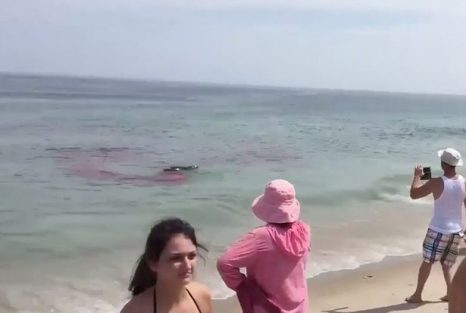
Surfers flee for their lives as ‘great white shark’ savagely attacks seal just yards from shore
Frantic surfers fled for their lives after suspected Great White Shark launched a savage attack on a seal just yards from show. A trail of blood could clearly be seen in the water as horrified onlookers were ushered off the sand and the beach was closed. A pair of desperate surfers, out on the ocean at Nauset beach in Orleans, America, frantically paddled to shore in the terrifying footage. Earlier this summer people heading to the beach in Cape Cod, Massachuesetts had been warned up to 150 great whites had been seen off the coastline – a huge boom in numbers. The numbers have been increasing over the past few years and has more than doubled since 2014. Video, click here to read the story! 10:27
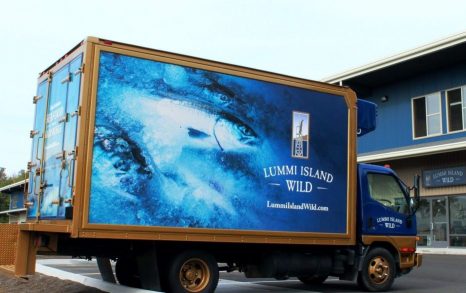
Lummi Island Wild Takes to the Streets with a Little Help from Signs Plus, Inc.
With eight of the only twelve reefnetting commercial fishing organizations in the world right here in Whatcom County, Lummi Island Wild is among the unique and truly sustainable businesses that bring our local fish to our grocery stores and ultimately our dinner tables. Lummi Island Wild, a locally-owned cooperative business, takes fishing and quality very seriously. From the fishing to the processing, they are part of every step – ensuring the highest quality of their products.,, Reefnetting, a historic Pacific Northwest fishing method, involves a spotter who calls to have the nets raised when he sees a school of salmon in place. The salmon are then rolled over the platform and into holding tanks full of seawater where they are allowed to rest. At that point, any unwanted bycatch is released unharmed back into the sea. “We do it differently and we do it better,” says Keith Carpenter, President and Executive Director of Lummi Island Wild. “We are committed to making things better.” click here to read the story 09:50
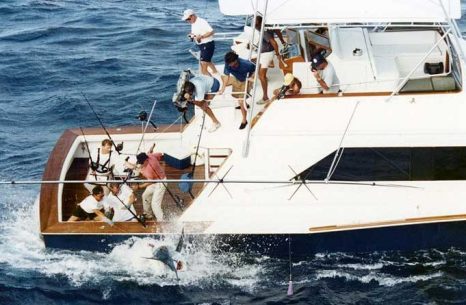
Modern Fish Act: boon to recreational fishing or risk to U.S. fishery?
The Magnuson-Stevens Fishery Conservation and Management Act sets strict, scientifically adjusted, annual catch limits on U.S. commercial, charter and recreational fisheries in order to sustain saltwater fish stocks, and is seen as a model of fishery management globally. The Modern Fish Act (MFA), a bill introduced in the U.S. House in April, would do away with limits on recreational fishermen, who argue they have no impact on fishery stocks. Environmentalists, however, say the MFA introduces legal loopholes that would allow for uncontrolled fishing at potentially unsustainable levels that could cause stocks to crash. Critics also say that the MFA muddies the waters between federal and state management, and allows political and economic considerations to override science in management decisions. The bill is still moving through Congress, and its chances for passage are presently unknown. click here to read the story 08:55
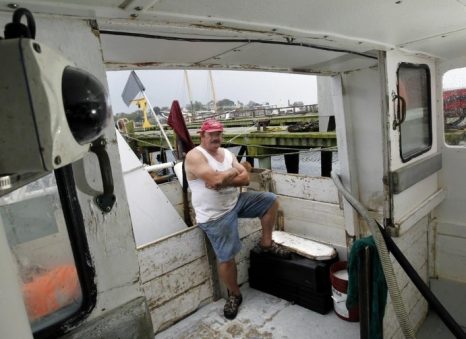
Mass delegation supports putting Carlos Rafael’s forfeiture toward electronic monitoring
John Bullard wants to arm fishing vessels with a smartphone — figuratively speaking. “Nobody has rotary phones anymore, we just assume smartphones are the way we communicate and all the benefits of smartphones we’ve come to expect as normal,” Bullard said. ”(Electronic monitoring) is what we’re going to transition to, but it’s going to take time.” NOAA’s Northeast Regional director said he believes current methods can lead to inaccurate science. Last week, NOAA conducted a fishing stock assessment meeting in New Bedford where similar concerns of bad science emerged. The root of the concern was data from false reports. Electronic monitoring, specifically cameras on vessels, would provide accurate information. click here to read the story 21:39
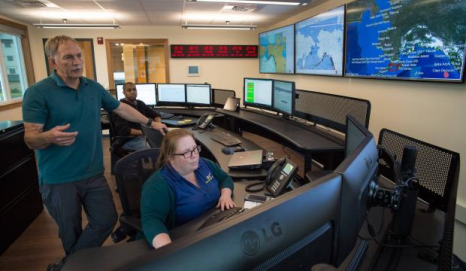
State-of-the-art facility in Harris Harbor matches boat watcher’s growth
Captain Ed Page, the Executive Director of the Marine Exchange of Alaska, stood on the roof of their new $4-million facility on the edge of Harris Harbor.,, The private nonprofit has just moved in and started operations from their new location last week. MXAK monitors vessels — everything from huge cargo ships to fishing vessels and Native whaling boats — on more square miles of ocean than any organization of its kind in the world. It’s an area stretching from the Dixon Entrance to the Beaufort Sea. click here to read the story 18:01
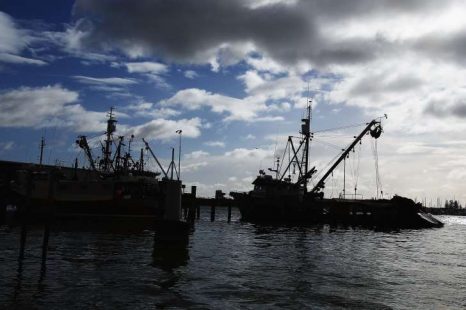
Cameras on boats ‘an invasion of privacy’
A group of fishermen could be heading to court to fight a plan to use cameras and GPS trackers to monitor commercial trawlers. Consultation by the Ministry for Primary Industries on the first phase of the rollout of the new technology closed yesterday. Some fishermen claim the cost and time involved could put many people out of business. New regulations, which start to apply next year, involve installing cameras and GPS technology on 1200 fishing boats in Southland. A group of 70 fishermen, mainly from Southland, have each pledged $1000 towards a legal fight to stop the move, with a decision due this week on whether to head to court. Bluff fisherman Chris Black said they were being treated worse than criminals. click here to read the story 15:44
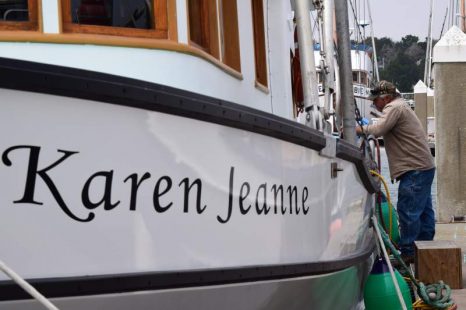
Drought years cut North Coast salmon population
Soon after the commercial salmon season opened on Aug. 1, Chris Lawson steered his 53-foot boat named Seaward out of the marina at Bodega Bay into ocean waters where he figured chinook salmon would travel. He spent the day trolling, his lines carefully prepared to entice the spirited, iridescent fish. There were plenty of salmon, but mostly two-year-olds too small for a commercial fisherman to keep. Lawson shook off nearly 100 short fish from his lines and kept just seven longer than the minimum size — 27 inches. He snagged $9 a pound for 63 pounds, yielding $567 for the day’s work before fuel expenses and pay to one crew member, who gets 20 percent.,, “Seven hours, we had seven fish,” Lawson said. “You make a little bit of money. There were a lot of short fish,” said Lawson, interviewed alongside his boat on Aug. 10. “It looks better for next year. Recreational guys are having an OK season.” Their size limit is smaller. click here to read the story 14:43
Coast Guard medevacs stabbed crewmen from a fishing vessel 40 miles south of Pensacola
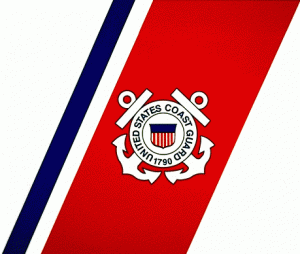 The Coast Guard medevaced two men who were reportedly stabbed aboard a fishing vessel 40 miles south of Pensacola, Florida, Sunday. Coast Guard Sector Mobile watchstanders received a report of two crewmembers reportedly being stabbed by a third crewmember aboard the commercial fishing vessel Billy B. Watchstanders directed the launch of a Coast Guard Air Station New Orleans MH-65 helicopter aircrew, the Coast Guard Cutter Kingfisher crew, and a Coast Guard Station Pensacola 45-foot Response-Boat Medium boatcrew with Sector Mobile Enforcement personnel aboard. The Kingfisher arrived on scene at 8:46 p.m. and brought the two crewmembers aboard. The MH-65 helicopter crew arrived on scene at 9:49 p.m. and hoisted the men and transferred them to Pensacola Baptist Hospital. One crewmember was reported in stable condition and the other in critical condition. The boatcrew detained the third crewmember and took the Billy B in tow en route to Perdido Pass, Alabama, with the Kingfisher as an escort. The incident is under investigation. –USCG– 13:03
The Coast Guard medevaced two men who were reportedly stabbed aboard a fishing vessel 40 miles south of Pensacola, Florida, Sunday. Coast Guard Sector Mobile watchstanders received a report of two crewmembers reportedly being stabbed by a third crewmember aboard the commercial fishing vessel Billy B. Watchstanders directed the launch of a Coast Guard Air Station New Orleans MH-65 helicopter aircrew, the Coast Guard Cutter Kingfisher crew, and a Coast Guard Station Pensacola 45-foot Response-Boat Medium boatcrew with Sector Mobile Enforcement personnel aboard. The Kingfisher arrived on scene at 8:46 p.m. and brought the two crewmembers aboard. The MH-65 helicopter crew arrived on scene at 9:49 p.m. and hoisted the men and transferred them to Pensacola Baptist Hospital. One crewmember was reported in stable condition and the other in critical condition. The boatcrew detained the third crewmember and took the Billy B in tow en route to Perdido Pass, Alabama, with the Kingfisher as an escort. The incident is under investigation. –USCG– 13:03
Trump team nears decision on national monuments
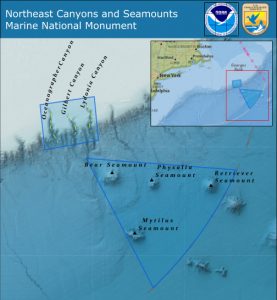 As Interior Secretary Ryan Zinke approaches the 24 August deadline for his recommendations to President Donald Trump on whether to alter dozens of national monuments, conservation proponents say it remains all but impossible to predict which sites the administration could target for reductions or even wholesale elimination.,,, Obama created the first Atlantic marine monument in 2016 when he designated nearly 5,000 square miles for preservation off the coast of Massachusetts.,, The Boston Globe reported that Zinke appeared sympathetic while meeting with about 20 representatives of New England’s seafood industry. “When your area of access continues to be reduced and reduced … it just makes us noncompetitive,” Zinke said at the time. “The president’s priority is jobs, and we need to make it clear that we have a long-term approach to make sure that fishing fleets are healthy.” click here to read the story 11:38
As Interior Secretary Ryan Zinke approaches the 24 August deadline for his recommendations to President Donald Trump on whether to alter dozens of national monuments, conservation proponents say it remains all but impossible to predict which sites the administration could target for reductions or even wholesale elimination.,,, Obama created the first Atlantic marine monument in 2016 when he designated nearly 5,000 square miles for preservation off the coast of Massachusetts.,, The Boston Globe reported that Zinke appeared sympathetic while meeting with about 20 representatives of New England’s seafood industry. “When your area of access continues to be reduced and reduced … it just makes us noncompetitive,” Zinke said at the time. “The president’s priority is jobs, and we need to make it clear that we have a long-term approach to make sure that fishing fleets are healthy.” click here to read the story 11:38
Congress Picks Sides on Trump Plan to Expand Offshore Drilling
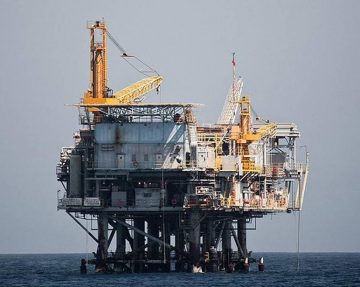 President Donald Trump’s plan to expand offshore oil drilling spurred dueling letters from members of Congress last week, 118 of whom say the plan is critical for U.S. energy security, while 69 others doubt it — plus nearly 18,000 letters of public comment, most of them opposing expanded drilling. Only 6 percent of the U.S. Outer Continental Shelf is available for leasing to oil and gas drillers from 2017 to 2022, under a drilling plan completed in the final days of President Barack Obama’s presidency. The shelf is 1.7 billion acres of submerged federal land from 3 nautical miles off the coastline, state-regulated waters, to 200 nautical miles out. click here to read the story 11:06
President Donald Trump’s plan to expand offshore oil drilling spurred dueling letters from members of Congress last week, 118 of whom say the plan is critical for U.S. energy security, while 69 others doubt it — plus nearly 18,000 letters of public comment, most of them opposing expanded drilling. Only 6 percent of the U.S. Outer Continental Shelf is available for leasing to oil and gas drillers from 2017 to 2022, under a drilling plan completed in the final days of President Barack Obama’s presidency. The shelf is 1.7 billion acres of submerged federal land from 3 nautical miles off the coastline, state-regulated waters, to 200 nautical miles out. click here to read the story 11:06
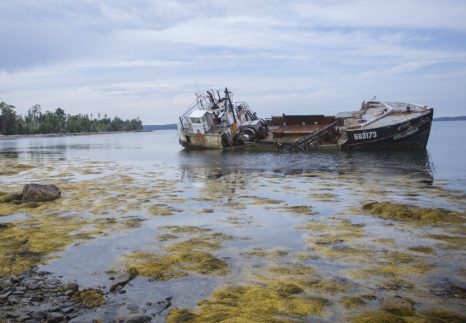
Abandoned wooden fishing vessel plagues island off Bristol
Thirty years before it washed up on Jimmy Ellsworth’s island shoreline as a rusted derelict, The Columbia was the Maine-built pride of the man credited with helping to jump-start one of New England’s largest modern fisheries. It was the last of a generation of wooden “draggers” that bridged the gap between the age of sail-powered fishing schooners and the rise of steel ships. But by the time Ellsworth saw it drifting toward his property, the 90-foot long F/V Columbia was a hulk without a home after being kicked out of two local harbors. click here to read the story 10:28
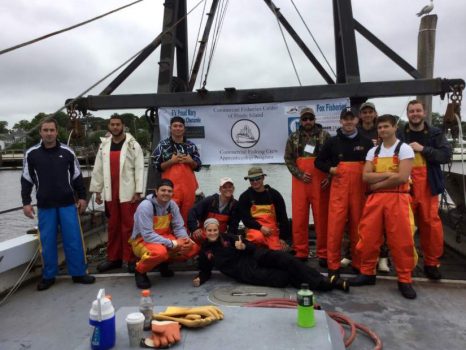
URI, Commercial Fisheries Center combine to create apprentice program in commercial fishing
In early July, a group of apprentices joined a pilot program designed to train new commercial fishermen and women. When the program ended 20 days later, not a single apprentice had dropped out. “We were very pleased with that,” said Barbara Somers, a research associate at the University of Rhode Island’s Department of Fisheries, Animal and Veterinary Science who helped put the program together. “We started with 12 and we ended with 12.” The program, funded by a $100,000 grant from the National Fish and Wildlife Foundation of the National Oceanic and Atmospheric Administration (NOAA), was a joint initiative of URI and the Commercial Fisheries Center of Rhode Island, a non-profit group representing nine fishing organizations. The goal was to produce skilled crews to replenish the declining ranks of the Rhode Island commercial fishery. click here to read the story 08:26
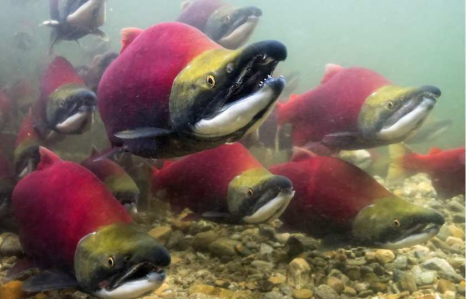
Federal fish policy a flop, study finds
Canada has one of the world’s most robust wild-salmon conservation policies, but has largely failed to execute its plan even as many B.C. salmon populations have fallen into crisis, according to a new study. The Wild Salmon Policy was hailed as “transformative and timely” when it was introduced in 2006, said lead author Michael Price, a biologist at Simon Fraser University. But 12 years in, Fisheries and Oceans Canada (DFO) is unable to determine the health or threat status of at least half of the province’s salmon populations, according to the study published in the Canadian Journal of Fisheries and Aquatics. click here to read the story 07:29
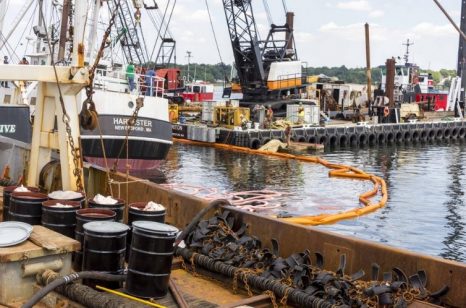
Coast Guard makes a push to curb harbor oil spills
Coast Guard Lt. Lynn Schrayshuen along with Marine Science Technician Third Class John Northrup peered into the dark water alongside Coal Pocket Pier at the city waterfront, looking for the tell-tale rainbow sheen of an oil spill. On this recent morning, they came up pretty much empty, with the exception of a small patch of oil alongside the hull of a fishing boat, too little and too dispersed after time elapsed to make an effective sample. It is not always this good. The previous morning, Northrup said, there were three spills that he discovered. In past years, there have been spills of hundreds of gallons of oil. Sometimes the Department of Environmental Protection or the Coast Guard can trace the spills, but oftentimes not. click here to read the story 18:41
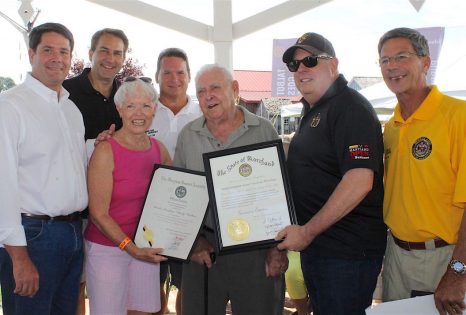
Talbot Watermen’s Association honors four local watermen
The Talbot Watermen’s Association and Gov. Larry Hogan honored four local watermen and remembered 15 during an opening ceremony for the eighth Watermen’s Appreciation Day on Sunday, Aug. 13, at the Chesapeake Bay Maritime Museum. The four local watermen who were honored with Governor’s Citations and citations from the Maryland General Assembly were Clifford “Big Daddy” Wilson, Capt. Stanley Larrimore, Capt. Woody Faulkner and Joe Spurry Sr. Talbot Watermen’s Association President Jeff Harrison said Faulkner began crabbing when he was 16 years old. While he did have to find work on land as a carpenter sometimes, due to “hard times” on the water, Harrison said Faulkner always came back to the water. “We want to honor him … for the spirit he had as a waterman,” Harrison said. click here to read the story 16:57
Christie gets it right on off-shore drilling, Virginia’s governor, not so much
![]() In an Aug. 16 letter to the Bureau of Ocean Energy Management, state Department of Environmental Protection Commissioner Bob Martin made clear the Christie administration does not support offshore drilling, rejecting the Trump administration’s commitment to expand off-shore energy exploration. click here to read the op-ed Then, there’s this. Virginia Opts Out of Offshore Lease Program –The Governor in the U.S. state of Virginia has changed his mind about offshore drilling.,,The letter says that with the Trump administration’s “reckless actions” regarding oil revenue-sharing with coastal states and the proposed cuts to funding for regulatory environmental agencies, “Virginia is left with only one option.” click here to read the story In Virginia, its all about the money. 12:52
In an Aug. 16 letter to the Bureau of Ocean Energy Management, state Department of Environmental Protection Commissioner Bob Martin made clear the Christie administration does not support offshore drilling, rejecting the Trump administration’s commitment to expand off-shore energy exploration. click here to read the op-ed Then, there’s this. Virginia Opts Out of Offshore Lease Program –The Governor in the U.S. state of Virginia has changed his mind about offshore drilling.,,The letter says that with the Trump administration’s “reckless actions” regarding oil revenue-sharing with coastal states and the proposed cuts to funding for regulatory environmental agencies, “Virginia is left with only one option.” click here to read the story In Virginia, its all about the money. 12:52
Using Satellite Communication on Your Boat
 When you’re offshore and waiting for your next bite, the cloak of isolation can be your best friend. But sometimes you can’t afford to be “dark” from your business or family for long stretches, so most captains opt for some type of satellite communication. There are a lot of options, but the trick is knowing what equipment you need and how to manage it.,,When you buy satellite service, you’re paying for the bandwidth and speed at sea. At home, 20 mbps is a good streaming rate. At sea, 1 or 2 mbps is tops. And it can cost as much as $1,000 per gigabyte. “Update a website like CNN,” says Comyns, “and you’ve used 2 megabytes. Suddenly your browsing adds up to real money.” click here to read the story 11:06
When you’re offshore and waiting for your next bite, the cloak of isolation can be your best friend. But sometimes you can’t afford to be “dark” from your business or family for long stretches, so most captains opt for some type of satellite communication. There are a lot of options, but the trick is knowing what equipment you need and how to manage it.,,When you buy satellite service, you’re paying for the bandwidth and speed at sea. At home, 20 mbps is a good streaming rate. At sea, 1 or 2 mbps is tops. And it can cost as much as $1,000 per gigabyte. “Update a website like CNN,” says Comyns, “and you’ve used 2 megabytes. Suddenly your browsing adds up to real money.” click here to read the story 11:06
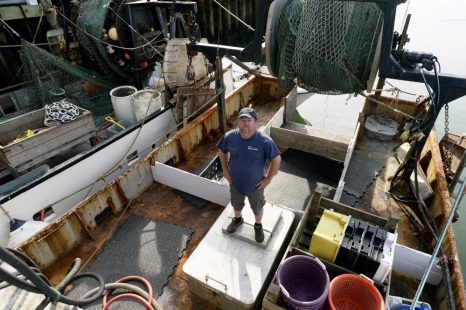
Maine fishermen, scientists combine forces with goal to save shrimp fishery
For more than 20 years, Dana Hammond made close to half his annual income shrimping. But his shrimping profits began to dwindle in 2013. That season, regulators were alarmed by the lack of shrimp biomass in the Gulf of Maine, and the amount he was allowed to catch was cut 72 percent. The fishery was closed entirely in 2014. It hasn’t reopened since and Hammond, who fishes out of Portland on his boat the Nicole Leigh, has been trying to make up the deficit from his other main source of income, groundfishing. But Hammond isn’t ready to let shrimping go. click here to read the story 09:22
Don Cuddy: Blue Harvest a major new presence among city fish houses
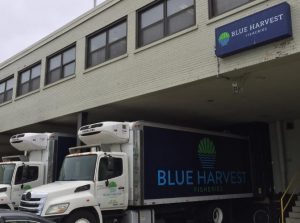 New Bedford is the top-grossing fishing port in the United States and has been since 1999; an enviable record and a tribute to the vision and expertise of all those involved in sustaining an industry that is constantly evolving. While industry momentum has not flagged, the players come and go as markets shift, regulations change and fish stocks rise or fall. Seafood processor Blue Harvest Fisheries is a big presence on the waterfront today yet the company was unknown in the city until relatively recently. So last week I had a chat with CEO and Acushnet native Jeff Davis, a 30-year veteran of the seafood industry, to learn more about Blue Harvest and all that they do. click here to read the story 20:06
New Bedford is the top-grossing fishing port in the United States and has been since 1999; an enviable record and a tribute to the vision and expertise of all those involved in sustaining an industry that is constantly evolving. While industry momentum has not flagged, the players come and go as markets shift, regulations change and fish stocks rise or fall. Seafood processor Blue Harvest Fisheries is a big presence on the waterfront today yet the company was unknown in the city until relatively recently. So last week I had a chat with CEO and Acushnet native Jeff Davis, a 30-year veteran of the seafood industry, to learn more about Blue Harvest and all that they do. click here to read the story 20:06
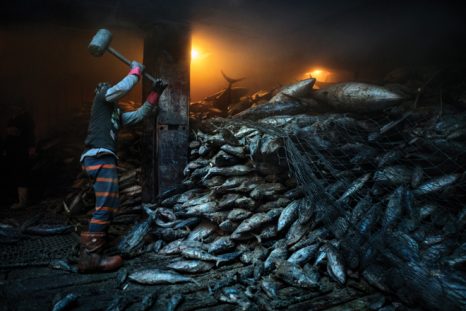
A Global Fish War is Coming
Nearly two decades into the 21st Century, it has become clear the world has limited resources and the last area of expansion is the oceans. Battles over politics and ideologies may be supplanted by fights over resources as nations struggle for economic and food security. These new conflicts already have begun—over fish. The demand for fish as a protein source is increasing. The global population today is 7.5 billion people, and is expected to be 9.7 billion by 2050, with the largest growth coming in Africa and Asia. Fish consumption has increased from an average of 9.9 kilograms per person in the 1960s to 19.7 kilograms in 2013 with estimates for 2014 and 2015 above 20 kilograms. The ten most productive species are fully fished and demand continues to rise in regions generally with little governance and many disputed boundaries. click here to read the story 17:36
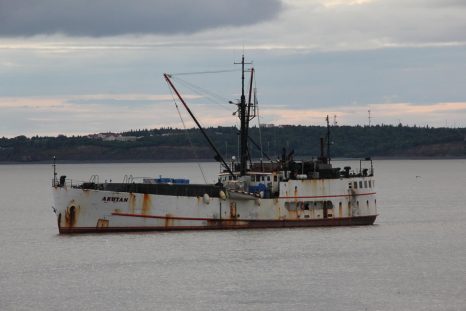
Unified command established in response to potential sinking of fishing vessel Akutan
The U.S. Coast Guard, the Alaska Department of Environmental Conservation and the city of Unalaska established a unified command in response to potential pollution from the fishing vessel Akutan near Unalaska, Alaska, Friday. Personnel from Coast Guard Sector Anchorage, the State of Alaska, the city of Unalaska and Resolve Marine Services, a salvage and repair company, are coordinating and overseeing the removal of environmental hazards, including anhydrous ammonia and various petroleum products onboard the fishing vessel Akutan. The unified command determined the steps taken by the vessel owner and operator as inadequate to prevent a potential pollution incident. The approximately 166-foot fishing vessel began transiting to Dutch Harbor from Bristol Bay earlier this month. Due to various mechanical issues the vessel anchored in Captains Bay where it remains, deteriorating. click here to read the press bulletin 12:36
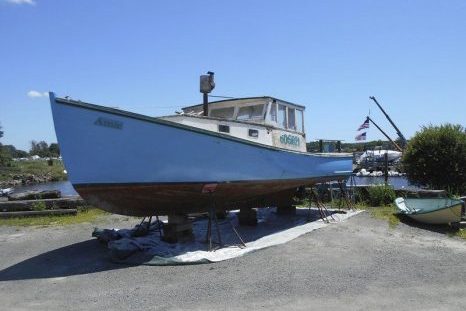
$8 lobster boat sells to Beverly man
A lobster boat for sale for $8 in Essex has found a home with a Beverly resident. Larry Stepenuck, a Rockport lobsterman, decided to cast off his 25-year-old wooden vessel, the middle Amie, when he purchased a new Amie, built by Brad Story. The older lobster boat was set at a low price, he said, as long as the new owner promised to put it back in the water. Stepenuck found that person in Larry Tamilio. Stepenuck said he didn’t expect the boat to “jump out of the yard.” click here to read the story 11:22
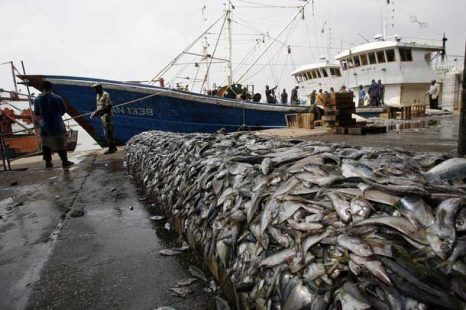
Fish Stocks And Our Balance Of Payments
Our balance of payments is overly burdened by our consumption of seafood: We import approximately 90% of the seafood that we eat. Given our natural resources, we should be net exporters of seafood. The total value of edible and non-edible fishery imports in the United States was $35.8 billion in 2016. The total value of edible and non-edible exports was $21.3 billion. The imbalance does not imply only a shipment of dollars abroad. It also implies a number of jobs exported, a number of jobs that could be created in this country, were we not to import that much more seafood than we export.,,, The reason for the imbalance in our accounts with other nations is not due to lack of fish in our waters. Not to put too fine a point on it, the imbalance is due to rules and regulations imposed by our National Marine Fisheries Service (NMFS) that prevent our fishermen from catching fish. click here to read the article by Carmine Gorga 09:21
Big Shrimpin’ – White shrimp could be gold for locals
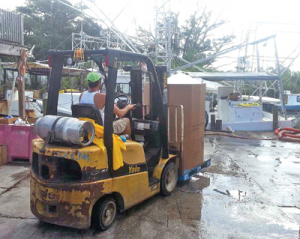 Dozens of local commercial fishermen are headed west this this weekend with the opening of Louisiana’s white shrimp season. The Mississippi shrimp season opened in June, but Louisiana has only been open for brown shrimp. Brown shrimp and white shrimp are different species of shrimp, but they both command similar prices, officials said.,, About two dozen local fishing boats set out from Bayou Caddy towards Louisiana on Friday and more cast off from others across the Gulf Coast. click here to read the story 08:47
Dozens of local commercial fishermen are headed west this this weekend with the opening of Louisiana’s white shrimp season. The Mississippi shrimp season opened in June, but Louisiana has only been open for brown shrimp. Brown shrimp and white shrimp are different species of shrimp, but they both command similar prices, officials said.,, About two dozen local fishing boats set out from Bayou Caddy towards Louisiana on Friday and more cast off from others across the Gulf Coast. click here to read the story 08:47
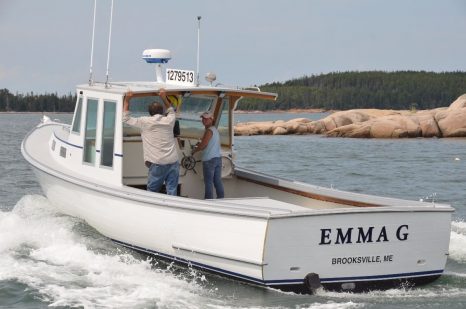
New wooden lobster boat launched at Billings
As lobstermen have seen higher earnings, they have been keeping Maine boatbuilders busy, ordering new and, generally, larger boats at what seems to be a record pace. Most of the new boats are built of fiberglass, but last Friday Stonington boatbuilder Peter Buxton launched a handsome 32-foot wooden lobster boat for Brooksville lobsterman Kathy Lymburner. Christened Emma G, the new boat is one of just a handful of wooden boats that will enter the lobster fishing fleet. For the past several years Lymburner and her sternman, Meg Carton, have fished out of a 28-foot fiberglass lobster boat. When Lymburner decided she wanted a bigger boat she went to Buxton to build it. click here to read the story 17:21
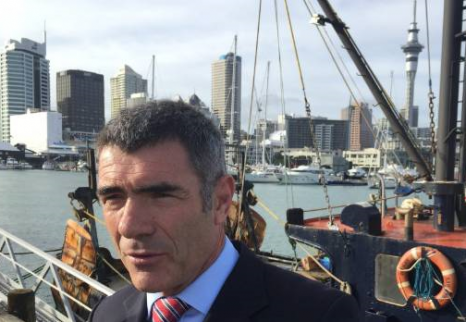
Feeding the data gluttons
I see the Ministry for Primary Industries is claiming it needs GPS tracking and cameras on commercial fishing boats to better monitor the fisheries and make better and more timely decisions. I say this is rubbish as we already give them tow by tow GPS coordinates and catch estimates in the trawl fishery and they do not use this information now. As for timely management decisions, well that’s a joke. Our elephant quota has been out of balance with catches for over 20 years. I spend more time avoiding fish than I do catching it. click here to read the letter 14:30
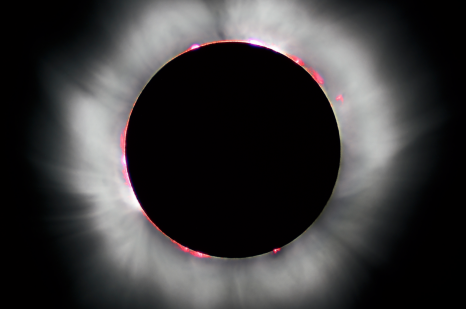
What happens in the sea during a solar eclipse?
On July 20th, 1963, three scientists sat on a research ship 200 miles south of Woods Hole, MA, waiting for something remarkable. They were nearly 4000m above the seafloor, and using sonar, they could ‘see’ a line of creatures resting in the deep. By this time, biologists were beginning to unravel the mystery of this ‘false bottom’–a layer in the ocean that looks the the sea floor on sonar but isn’t–which covered much of the ocean. This false bottom rises in up at night and sinks down during the day. This rising and falling is in fact caused by the largest migration of animal on Earth–everything from fish, shrimp and jellyfish, moving hundreds of meters in unison up and down each day. But how and why these animals rose in fell in the ocean wasn’t clear. As the scientists watched their instruments, the light began to fade. Not from the setting sun, but from something else. click here to read the story 13:27






